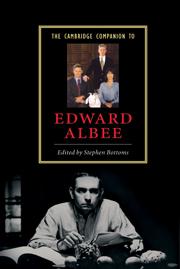Book contents
- Frontmatter
- 1 Introduction
- 2 Albee’s early one-act plays
- 3 Who’s Afraid of Virginia Woolf?
- 4 “Withered age and stale custom”
- 5 Albee’s 3½
- 6 Albee’s threnodies
- 7 Minding the play
- 8 Albee’s monster children
- 9 “Better alert than numb”
- 10 Albee stages Marriage Play
- 11 “Playing the cloud circuit”
- 12 Albee’s The Goat
- 13 “Words; words... They’re such a pleasure.” (An Afterword)
- 14 Borrowed time
- Notes on further reading
- Select bibliography
- Index
- Series List
4 - “Withered age and stale custom”
Marriage, diminution, and sex in Tiny Alice, A Delicate Balance, and Finding the Sun
Published online by Cambridge University Press: 28 May 2006
- Frontmatter
- 1 Introduction
- 2 Albee’s early one-act plays
- 3 Who’s Afraid of Virginia Woolf?
- 4 “Withered age and stale custom”
- 5 Albee’s 3½
- 6 Albee’s threnodies
- 7 Minding the play
- 8 Albee’s monster children
- 9 “Better alert than numb”
- 10 Albee stages Marriage Play
- 11 “Playing the cloud circuit”
- 12 Albee’s The Goat
- 13 “Words; words... They’re such a pleasure.” (An Afterword)
- 14 Borrowed time
- Notes on further reading
- Select bibliography
- Index
- Series List
Summary
“I don’t want to kiss you, Martha.”
George, in Who’s Afraid of Virginia Woolf?“Marriage is a confusing business.”
Butler, in Tiny AliceFor all the controversy stirred by the shock value of the language in Edward Albee's early work, his plays are surprisingly chaste - more about lack of, or loss of, desire than sex. There is an erotic component missing from his plays, sometimes replaced by madcap performativity, as in the games in Who's Afraid of Virginia Woolf? or Claire's dipsomaniacal antics in A Delicate Balance, and sometimes replaced by explosions of language, as in The Zoo Story (1959). Loneliness and alienation seem more important than sexual desire, which is usually more memory than present reality. Albee's The Zoo Story can be seen as a Central Park homosexual pick-up, but it ends in penetration by knife, not penis. Jerry may remember fondly his one homosexual affair, but he has forsaken homosexuality for joyless heterosexuality. Indeed, the rejection of the possibility of homosexual love for a compromised heterosexuality on the part of Albee’s characters and the playwright himself, in his work, is a particular problem for critics of Albee’s plays and may be responsible for some of their chilliness. Albee seems unable to read his own sexual desires and experiences into his heterosexual characters, which creates a nonerotic coolness. It is no wonder that frustration, not desire, is the compelling emotion in Albee’s work.
- Type
- Chapter
- Information
- The Cambridge Companion to Edward Albee , pp. 59 - 74Publisher: Cambridge University PressPrint publication year: 2005

